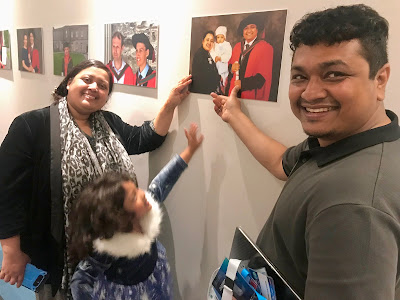In celebration of international Mother Language Day we installed, in the foyer of our workplace (the Insight Centre for Data Analytics, Data Science Institute, NUI Galway), a World Map in which our colleagues decorated with scripts written in the alphabets of their own language.
February 21st is a global day of commemoration designed to
increase awareness of linguistic and cultural diversity. It is officially
recognised by the Galway’s United Nations: 31 Languages spoken at my university workplace as an opportunity "to promote the
preservation and protection of all languages used by peoples of the
world."
It was first initiated by Bangladesh. So it is appropriate then that it
was my good friend and colleague Safina Showkat Ara from that country who
suggested that we also mark this very important occasion at our research
institute. I was only to happy to oblige.
And what a wonderful exercise it turned out to be. For in populating the
map we happily discovered that there are at least 34 languages spoken at our
research institute- Arabic, Armenian, Bangla, Czech, Dutch, English, French, German,
Greek, Hindi, Irish, Italian, Kannada, Kashmiri, Kurdish, Magahi, Mandarin,
Marathi, Nepali, Pashto, Persian, Polish, Portuguese, Punjabi, Ukrainian, Urdu, Russian, Sanskrit, Slovene,
Spanish, Swahili, Tamil, Vietnamese and Yoruba. Wow!
We hope that this new initiative will become a new tradition that will
continue to be observed for years and years to come.
It is also worth noting that my other good friend and colleague Sina
Ahmadi correctly pointed out that millions and millions of people across the world are
today deprived of learning in their mother language in their own countries.
Denial of a people’s right to express their cultural identity has been used
throughout history by brutal repressive regimes often to overcome resistance to
foreign rule. For hundreds of years the British imperial forces in Ireland tried
to destroy our right to independence by a combination of war, ethnic cleansing,
introduction of foreign settlements, economic exploitation and a denial of
cultural expression by the native Celts.
It was Pádraig Pearse, the great Irish revolutionary and leader
of the 1916 uprising against British rule, who summed up so well the need to
resist the latter policy of ‘cultural assimilation’, “A country without a language
is a country without a soul.”
Today cultural assimilation is the policy of many countries towards
indigenous peoples living in forests, wetlands and mountains, none more so than in Brazil where President Bolsonaro
aggressively pursues a campaign of taking Amazonian lands from the
Amerindians for commercial exploitation by ranchers, palm oil growers, miners
and loggers leading in the process to the loss of the Earth’s lungs.
In a time of growing globalisation it is important that we promote
harmony, the sisterhood /brotherhood of humanity, and peace between cultures,
race and sexes based on respect and equality. Fundamental to this view is that
we should also treasure diversity in all its form. For the world would be so
much poorer if we lose our traditions, heritage and language. Variety is after
all the spice of life!
Furthermore, as you can see from the large poster in the front of the photograph, our institute is where people from all over the world come together to work on research into tackling Climate Chaos in so many sectors (peatlands, air, water, waste, manufacturing, cities...). We stand united for the common good.
Nóta: Tá muintir na Rúise agus na hÍsiltíre inár n-ionad oibre a labhraíonn Gaeilge!







